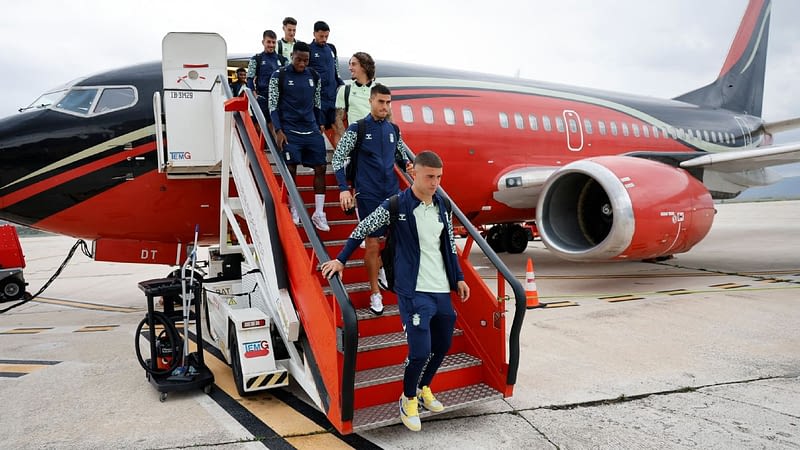Behind the Scenes of Las Palmas’ Grueling 1,300-Mile Journey to Victory
César Robledo has a job that most people wouldn’t envy, but he wouldn’t trade it for the world. It’s just before 7 p.m. on a Saturday evening, and the big yellow bus he drives has pulled into the Vall d’en Bas hotel in the serene Catalan countryside. His passengers, the footballers of Union Deportiva Las Palmas, have disembarked, leaving him to clean up the aftermath of their journey. The paper-bagged picnics, each labeled with squad numbers, have been devoured. A few cans of Pio Pio, the club’s very own beer, have also been enjoyed. The scene is one of quiet satisfaction for Robledo.
“I prefer to arrive and spend an hour, even two, tidying than go to my room,” Robledo says. “Because that means they’ve won, and they’re happy.”
And happy they are—ecstatic, even. A celebration has erupted on the bus, and for good reason: Las Palmas has just made history by becoming the first team this season to beat Barcelona on their home turf, securing a stunning 2-1 victory at Montjuic. Vicente Gomez, a Las Palmas native and former midfielder who now works in the club’s sporting directorate, greets the players with a simple but powerful statement: “You don’t know what you’ve done.”
What they’ve done is monumental. This is Las Palmas’ first win at Barcelona in 53 years. Just two months ago, they were languishing at the bottom of the table. Now, they’ve won four of their last six matches. The turnaround is nothing short of remarkable.
A Journey Like No Other
Las Palmas’ journey to this historic moment is as literal as it is metaphorical. Based in the Canary Islands, the team faces a grueling 1,350-mile trek to Barcelona. The Canary Islands, located off the coast of Western Sahara, are a world apart from mainland Spain, with a different climate, character, and even time zone. At their training ground in Barranco Seco, the temperature soars above 30 degrees, with a desert sand haze adding an orange tint to the sky. “This is the good part,” says Luis Helguera, the club’s sporting director, with a smile. The challenges, however, are immense.
Imagine Liverpool playing away games in Athens or Moscow every other week. That’s the reality for Las Palmas. The travel impacts everything: preparation, training schedules, recovery, and even the players’ moods. “But we never highlight the negative; if you do, you feel even more tired,” says Diego Martinez, the coach who took over in October.
Logistical Nightmares
Behind the scenes, the logistics are a Herculean task. Ruben Fontes, the team’s delegate, is responsible for coordinating travel, and it’s no small feat. Moving a football team involves balancing financial constraints with the players’ physical and mental well-being. Charter flights, which cost around €50,000 per game, are a luxury the team can rarely afford. Instead, they often rely on regular flights, which cost closer to €7,000 but come with their own set of challenges, like securing 50 seats on short notice.
- 23 players, including a third goalkeeper
- Coaching staff, physios, and medical personnel
- Club directors and media staff
- 750 kilos of luggage, including training and match kits
Fontes meticulously plans every detail, from departure times to meal schedules, and communicates it all through a WhatsApp group. “Don’t forget your passport,” he reminds everyone. But even the best-laid plans can change. A last-minute Copa del Rey draw against Barcelona-based Europa means the team has to extend their stay, adding more flights, hotel rooms, and costs to the already complex operation.
The Human Element
Amid the chaos, the human side of the story shines through. Melania, who handles the laundry, carefully packs four days’ worth of training kits for each player. Oscar, the kitman, ensures every piece of equipment is accounted for, from deflated footballs to a portable grill. Even the team’s PlayStation makes the journey. “I don’t weigh the cases; I just know now,” Oscar says with a laugh.
Meanwhile, Dr. Diosdado Bolanos, affectionately known as “Doki,” prepares medical supplies, ensuring he won’t have to scramble for a pharmacy in a foreign city. The players, too, have their routines. Some play cards, others watch movies or sleep during the flight. Compression socks and stretching sessions help combat the physical toll of travel.
Game Day Glory
On match day, the team’s meticulous preparation pays off. After a light breakfast and a final team meeting, they head to Montjuic. The game kicks off at 2 p.m., and by 4:03 p.m., history is made. Las Palmas’ 2-1 victory over Barcelona is a testament to their resilience, both on and off the pitch.
As the team boards the bus for the journey back, beers in hand, the sense of accomplishment is palpable. For César Robledo and everyone involved in this extraordinary operation, moments like these make it all worthwhile.
Originally Written by: Sid Lowe





















